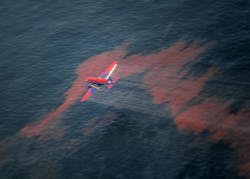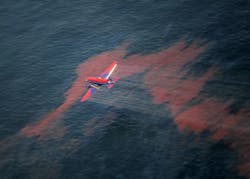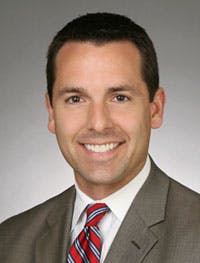Congress considering sweeping measures in aftermath of Deepwater Horizon incident
Michael D. Olsen, Scott A. Overland, and Scott H. Segal
Bracewell & Giuliani LLP, Washington, DC
In the wake of the world's largest accidental oil spill, politicians and environmental groups have been clamoring to capture the public's outrage and funnel it into sweeping legislation that would overhaul the oil and gas industry.
Dozens of bills that take action on a variety of issues have been proposed. Most of them attempt to regulate offshore drilling through increased bureaucracy, taxes, and unlimited liability for spills, regardless of actual risk.
While the US House of Representatives has already succeeded in passing legislation to this effect, the larger barrier to passage, as with any controversial proposal, lies in the United States Senate.
This article focuses on efforts to change the liability scheme under the Oil Pollution Act of 1990 (OPA), one of the most divisive issues in the major proposed oil spill response legislation. It is important, however, to understand first how the debate has developed to this point, the current political reality in Washington (particularly with elections looming), and why the drive for a broad overhaul of drilling laws appears to be running out of gas.
The summer of 2010: Congressional outrage is slowly mutedFrom April 20, the date of the Macondo well blowout in the deepwater Gulf of Mexico, until Congress' August recess, at least 18 different committees in both the House and Senate held more than 75 hearings on topics relating to the spill. In these inquiries and investigations, Congressmen and Senators repeatedly scolded witnesses from BP, Transocean, Halliburton, the Department of the Interior, and others.
While live video of the oil streaming into the Gulf of Mexico ran on television, feeding Americans' anger, Congress promised decisive action to ensure that a spill like this never occurred again, and said that those responsible would not be let off the hook. With each failed attempt to stop the spill, Members of Congress yelled louder and promised more action, while at the same time mocking efforts to stop the flow of oil with methods such as the "junk shot" and the "top hat."
As the summer months wore on, science began to catch up with the political rhetoric. Oil was captured, skimmed, burned, or dispersed. Tens of thousands of miles of threatened coast was reduced to thousands, and then hundreds. And then the well was capped.
While no prominent Member of Congress argued that the plugged well made legislation unnecessary, the momentum that had been driving the hard-line speeches began to subside. News stories, which for months had been on the front pages of every major newspaper, began to fall below the fold, and then off the front page.
Meanwhile, Congressional hearings turned to markups, and legislation addressing a wide range of issues began to wind through the law-making process. In the end, the Consolidated Land, Energy and Aquatic Resources (CLEAR) Act was brought to the House floor, and despite overwhelming opposition from Republicans and some oil-state Democrats, the legislation passed the House of Representatives, 209-193.
In the Senate, Majority Leader Harry Reid had been planning for weeks to hold a vote on comprehensive energy legislation before the August recess. Gradually, it became clear that Senate consideration of a comprehensive energy bill was unlikely, and a more narrow oil spill response bill began to be touted as the "must pass" legislation.
In the week leading up to the August recess, frustration with Reid's proposal became apparent, and grew to a point where consensus – not only in the wider Senate – but within the Democratic caucus, seemed out of reach. Consequently, Reid delayed votes on the bill until after the August recess, a positive move according to some Democrats. Most observers, however, acknowledge that this approach will be met by an even harsher political landscape as the November elections approach.
Looking to the fall: the battle over liabilityWhile each legislative proposal contains controversial provisions worrisome to the oil and gas industry, proposed changes in liability under OPA have begun to cause considerable consternation for small to midsize operators and shallow water drillers.
OPA was designed to prevent oil spills and facilitate a response. Under OPA, responsible parties must pay all cleanup costs related to a spill from an offshore facility. Consequential costs are capped at $75 million. If claims exceed the $75 million cap, responsible parties can tap the Oil Spill Liability Trust Fund for up to $1 billion. If the spill is determined to be the result of gross negligence, willful misconduct, or a violation of federal regulations, then liability is unlimited.
OPA also requires that offshore operators establish and maintain evidence of Oil Spill Financial Responsibility (OSFR) for removal costs and damages caused by a spill. Leaseholders must show at least $35 million dollars per 35,000 barrels of "worst case oil-spill discharge" up to a maximum of $150 million. OSFR can be demonstrated through insurance, a surety bond, a guarantee, a letter of credit, qualification as a self-insurer, or other evidence of financial responsibility.
Current legislative proposals vary in the changes they seek to make to the current liability scheme, and most of those with any chance of passage could be crippling to the oil and gas industry. For example, any legislation that lifts liability limitations completely, with no regard for actual risk, could put many, if not all, shallow water drillers and independent operators out of business.
According to testimony presented by the Insurance Information Institute to the House Committee on Transportation and Infrastructure, energy insurers do not have the capacity to insure for unlimited liability. Consider the following: the entire energy insurance market consists of a maximum of $3 billion in annual premiums; higher liability limits will increase the demand for coverage and exhaust available capacity; underwriting for unlikely but extremely severe events is challenging for insurers; increased demand coupled with an increase in risk assumed by insurers will raise the cost of coverage, disadvantaging those that cannot self insure and potentially driving them from the Gulf of Mexico.
Despite opposition from a nearly united Republican front and several Democrats, the House passed the CLEAR Act with unlimited liability and an OSFR requirement of $300 million. In order to pass a bill in the Senate, however, Democratic leadership must develop a strategy that will attract oil state Democrats and moderate Republicans.
Nonetheless, like the CLEAR Act, Sen. Reid's bill retroactively removes the $75 million liability cap. But the CLEAR Act and Reid's bill are not the only legislation dealing with these issues. Other proposals attempting to strike a compromise have arisen in the Senate.
Senators Mary Landrieu (D-La.) and Mark Begich (D-Ak.) both represent states with a heavy reliance on the oil and gas industry. Both have proposed liability provisions that to some degree reflect recognition of the damage that the elimination of a liability cap would inflict.
Sen. Landrieu's measure removes the $75 million liability cap and establishes a "mutual insurance fund." The fund would cover damages up to a "per incident" cap of $10 billion with a deductible of $250 million. If economic damages associated with a spill exceed $10 billion, the company responsible for the spill would again be responsible for the costs, with no limit on liability.
Sen. Begich's proposal requires that companies carry at least $250 million in insurance, an amount that may be raised by the Secretary of the Interior. Beyond the $250 million individual company liability amount, all Outer Continental Shelf producers would collectively share liability for up to $20 billion in damages. The responsible company would be required to pay any portion above the $20 billion amount.
While unlimited liability and increased requirements for OSFR would be detrimental to the entire offshore industry, they could spell disaster for companies working in shallow water. The bills recognize no distinctions based on the level of drilling risk and create no relief valve for smaller, independent companies.
Offshore operations with the most at stakeMore than 46,000 wells have been drilled in the Gulf's shallow waters since 1949. Over 11,000 shallow-water wells have been drilled in the last 15 years alone, and only 15 barrels of oil have been spilled. Shallow-water drillers utilize traditional, proven well-control methods, and workers have immediate access to the wellhead. Moreover, blowout preventers (BOPs) are located on the rigs' surface, allowing easy, ongoing inspections, maintenance, and repair.
These bills would be devastating to independent operators and shallow-water drillers that are already struggling with the impact of a delayed permitting process that at its current rate will soon result in the idling of the majority of shallow-water rigs.
The shallow-water drilling industry employs nearly 40,000 of the roughly 150,000 workers engaged in the business of developing our offshore energy resources. In addition, the 284 independent companies working in the Gulf last year were responsible for 73% of total production, thousands of jobs, and nearly $38 billion in total economic impact. Many of these companies have all their assets in the Gulf.
Final thoughtsProspects for legislation are sometimes difficult to predict. This year, the upcoming elections and a worsening economy are making the legislative crystal ball even cloudier. Despite the fact that the popularity of oil-spill response legislation has waned since the plugging of the Macondo well, it behooves oil and gas companies to take a close look at the provisions of pending legislation, notably those relating to oil-spill liability. An ounce of legislative prevention now can be worth far more than a pound of cure in the future. OGFJ
About the authors
"Any legislation that lifts liability limitations completely, with no regard for actual risk, could put many, if not all, shallow water drillers and independent operators out of business."
More Oil & Gas Financial Journal Current Issue Articles
More Oil & Gas Financial Journal Archives Issue Articles
View Oil and Gas Articles on PennEnergy.com


